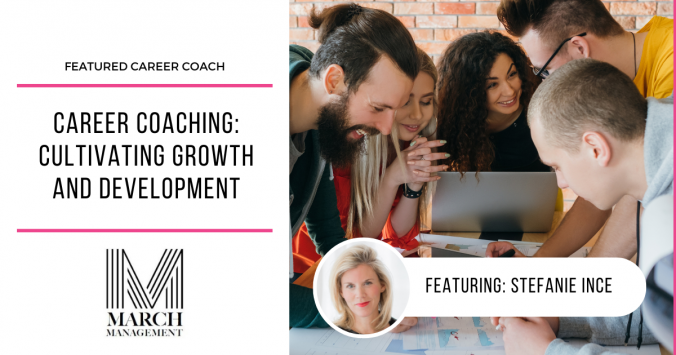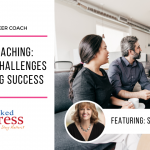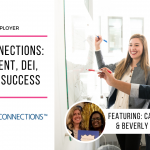TalentEgg was granted the opportunity to speak with Stefanie Ince, a certified and experienced career coach based in Toronto, Ontario. She is the founder of March Management, a business that offers its clients strategic career coaching services. Stefanie’s vision is to provide the finest personalized professional development services while empowering her clients to thrive at work and in their daily lives. We delved into why she chose career coaching, her most outstanding achievements, and her thoughts on imperative topics like DEI, mental health, and more.
Stefanie’s Career Inspiration
Before becoming a career coach, Stefanie had a storied 20-year career in the not-for-profit sector. What caused this drastic career pivot after such a long tenure in the not-for-profit sector? Stefanie explains, “I have always been passionate about having an impact in my professional life.” This passion and drive led her to start her own company. “I started March Management with a goal to provide coaching services to help individuals really see themselves and gain clarity about their objectives for their professional lives.”
Stefanie’s Greatest Achievements
As a career coach, Stefanie works with a lot of students. This field can be highly rewarding, helping emerging professionals find success and accomplishment in the workplace. She has had many achievements helping others in this sector, but she shared with us her greatest one. “I would say that my greatest achievement is when I can help my clients to really see themselves – through the identification of their strengths and superpowers.”
Stefanie believes instilling confidence in students and helping them align their interests with a particular professional path is the ultimate feat. Building a plan for a professional life starts with believing in who you are as a person, and she wants to help students accomplish this.
Going forward, Stefanie hopes to use her own knowledge and advice internally. “I hope to do what I encourage my clients to do – continue to learn and grow, and share what I learn with my clients!”
Successfully Transitioning Students from School-to-Work
The school-to-work transition is a massive challenge for students. Recently, the current economy has made it more difficult than previous years to break into an entry-level position. Given her role as a career coach, it’s intriguing to learn about the advice Stefanie provides students aiming to break into the industry. She told us she encourages students and young professionals to be “brutally honest” with themselves about what they want to do.
“We can all get caught up in doing what we think we are supposed to do rather than what really lights us up inside, and I try to challenge my clients to think about that.”
Students’ Biggest Pain Points
The school-to-work transition is not simple, many hurdles are in the way of these students. She emphasizes a common struggle she sees, “confidence is a real challenge for students, because in many cases, they don’t give themselves enough credit for the experiences that they already have.”
The pandemic unfortunately has amplified this problem, “I think that confidence has always been an issue, but because of the pandemic, people may have been more isolated in the last few years, which can amplify their anxiety or lack of confidence.” According to Stefanie, creating a safe space for students to come out of their comfort zones is also essential.
Diversity, Equity and Inclusion Among Students And New Grads
DEI has become a significantly noted topic in the modern workplace. Many workplaces and companies are adopting more diversity and more inclusive policies. This topic has also become an essential part of career coaching in the modern era.
That is why Stefanie has added a twist on her DEI philosophy. “I have been using the term DEIB, with the “B”, standing for ‘belonging,’” she continues, “my coaching philosophy is grounded in encouraging people to see themselves as they are.” She stresses the importance of celebrating what makes us different. “An important part of really seeing ourselves, and understanding what value we bring to an organization or community.”
It can be seen that the new generation of workers place high importance on these issues, and for good reason. But what can employers do to make sure they are respecting DEI? “I think what employers need to understand is that being inclusive, creating and sustaining a culture that is dedicated to DEIB principles is essential for recruiting and retaining top talent.”
Stefanie is amazed to see emerging professionals and students demanding these principles in the workplace. “It makes me excited to be able to work in this area – where candidates are creating such impactful culture shifts in the industry.”
Mental Health In The Workplace
Since the pandemic, mental health has deteriorated amongst Gen Z. It has become more and more important that employees’ mental health and wellbeing is respected. “In my opinion, mental health is the most important issue we are facing right now.” She emphasizes, “that it all starts at the top” and that mental health impacts all of us, and having conversations within your organization and having a safe corporate culture is crucial.
With that in mind, there are important strides employers need to take to make sure mental health is held in high regard. Stefanie shared the findings of a study with a corporate client, “which found that when an employer is committed to mental health, their employees HAVE better mental health. What this means is that creating a corporate culture that breaks down stigma and encourages open conversations about mental health can and will have an impact.”
She continues by saying that the importance of one-to-one conversations can’t be understated. Encouraging honest and open discussions about hopes and fears can be a vulnerable subject, but those are the types of conversations she thinks we should be having in the workplace.
How Employers Can Support Young Talent
Stefanie shares how employers can better support their young talent. “Students want to work for companies that care about them and about making the world a better place. So, I think the most important thing that employers can do is just that.”
That’s not all. A manager committed to developing young talent, an inclusive company culture, and flexibility are other ways she pinpoints.
How Employers Can Attract Top Students
It is crucial for employers to stay on top of modern issues like DEI and mental health if they want to continue to attract emerging professionals. Stefanie mentioned previously “DEIB” principles are essential for recruiting talent, but what else?
Stressing the importance of employee support, “to invest in people – providing a fair salary, tools and supports required to ensure employees are doing the best job they can do, emotional support, coaching, and other ways that demonstrate that they really care is also really important.”
“To create a corporate culture that encourages growth, development, safety, DEIB Principles and a healthy workplace is the first step,” she also highlights.
Stefanie offers one last piece of advice for fellow career educators in this field. She explains,
“I think that students have a lot to teach us. We should remember that, pay attention, listen and learn.”
Stefanie Ince is a certified career coach in Toronto, providing personalized, leadership coaching for her clients for whatever part of their journey. She founded March Management with a vision to provide career and leadership coaching services that will empower her clients to live their best, most authentic lives at home and work.





